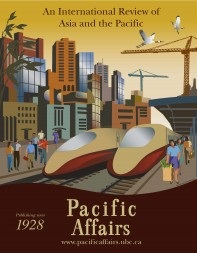Memo #6
By: Pacific Affairs
 In recent years, at least three prominent Chinese news agencies, Xinhua, CCTV, and People’s Daily, have announced that they were “going global.” All of them are now providing news coverage in various languages to global audiences. The motivation behind the move is to provide what Chinese officials and intellectuals have described as “better” and “more objective” coverage, especially of China itself.
In recent years, at least three prominent Chinese news agencies, Xinhua, CCTV, and People’s Daily, have announced that they were “going global.” All of them are now providing news coverage in various languages to global audiences. The motivation behind the move is to provide what Chinese officials and intellectuals have described as “better” and “more objective” coverage, especially of China itself.
The insinuation that western media are biased and uninformed about China is by no means new. In Timothy Weston’s article about China and professional journalism, he shows this to be almost a century old. In the period immediately following the fall of the last imperial dynasty in 1911 and the meeting of the Press Congress of the World in Honolulu in 1921, Chinese journalists became fully aware of the power and bias of the western media. Weston describes the Congress as a “turning point”.
In a story rich with historical detail, Weston shows, from 1911-1921, how a handful of American universities were heavily involved in professionalizing Chinese journalists. One of the perhaps unexpected lessons that Chinese journalists learned in this process was the media’s role in shaping public opinion and impacting how events unfold. At the Congress, Chinese journalists raised this point as an example of how the western media’s behaviour was inconsistent with its own professional standards.
Moreover, they added, rather than challenging the unequal power relations of the early 20th century world, the western media was complicit in replicating them. The most stinging criticism, however, was directed specifically at western coverage of China. Chinese journalists charged this coverage as being full of “false, misleading and negative” information. Weston’s analysis provides a well-researched historical background to issues that remain highly relevant, especially in light of the recent announcements by the Chinese news agencies.
About the Author:
Pacific Affairs is a peer-reviewed, independent, and interdisciplinary scholarly journal focusing on important current political, economic and social issues throughout Asia and the Pacific.
Links:
- Timothy B. Weston, “China, Professional Journalism, and Liberal Internationalism in the Era of the First World War,” Pacific Affairs, volume 83, No. 2, June 2010.
- Willy Lam, “Chinese State Media Goes Global: A Great Leap Outward for Chinese Soft Power?” Jamestown Foundation China Brief, volume 9, Issue 2, January 2009.
- A timeline of the relationship between Chinese journalists and the University of Missouri School of Journalism, particularly the integral role of Walter Williams.
Related Memos:
- Our other Memos about China.
- Other Memos inspired by Pacific Affairs articles.